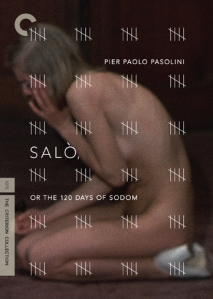Morality Bites: Of Horror and Empathy
The following is my contribution to my two online blogging colleagues (Ronan’s Belfast based film review site Filmplicity and Julian’s Dirty With Class site) and their intriguing blogathon which asks this philosophical question:
“Do filmmakers have a moral responsibility?”
I guess I can go either way on this query. On the grounds of argument sake, I’m repurposing a piece I wrote back in late-summer 2008 in an attempt to force me to come down on one side.
 In late-August 2008, the wonderful and eclectic folk at the Criterion Collection re-released Pasolini’s Salo (120 Days of Sodom). If that title doesn’t ring a bell, it was the last, highly controversial work of that Italian artist, intellectual, filmmaker and writer. Based on a work of torture/degradation by the Marquis de Sade, it is said that it was Pasolini’s masterwork examining Fascism (and Capitalism) in general, and Italy during World War II in particular. I’ve heard that many college film courses screen and examine this work — and that it’s been described as nauseating, gory, sick, and nothing less than pornographic. I’ve always wanted to see the film that some viewers describe this way only because many others consider it a masterpiece. The question is, why haven’t I?
In late-August 2008, the wonderful and eclectic folk at the Criterion Collection re-released Pasolini’s Salo (120 Days of Sodom). If that title doesn’t ring a bell, it was the last, highly controversial work of that Italian artist, intellectual, filmmaker and writer. Based on a work of torture/degradation by the Marquis de Sade, it is said that it was Pasolini’s masterwork examining Fascism (and Capitalism) in general, and Italy during World War II in particular. I’ve heard that many college film courses screen and examine this work — and that it’s been described as nauseating, gory, sick, and nothing less than pornographic. I’ve always wanted to see the film that some viewers describe this way only because many others consider it a masterpiece. The question is, why haven’t I?
My wife, who knows my love of film (and books), and the many DVDs that we house, would just laugh at this. Why? She knows that I’ve watched a great many movies, that to her, are disturbing. I’m sure that she bases this on a good bit in the collection (books, too) that are in the horror category. Yes, I admit, that for many years since my teens I’ve read, listened, or watched those works that go bump in the night (along with other genres). I remember (fondly) when my relatives warned me to not to go and see The Exorcist when it first hit the theaters. Of course, for my brother (the more strong and silent type of my mother’s two sons) they didn’t worry or say anything to him about it. The end result? He went to see it, and slept with the lights on in his room for the next three months, afterwards. Me? All I wanted to do was read the William Peter Blatty book that it was based upon.
But, interestingly, not all horror works attract my attention. The trend of gore, perhaps started in the low-budget, exploitive works of the sixties & seventies, in the horror category is a clue, here. Am I frightened or repulsed by it? If it’s something inherent or logical in a good story, the answer is no. Alien, with its (in)famous chest burster scene, is one of my all-time favorites. Same goes for John Carpenter’s The Thing, where its extraordinary make-up and grisly effects added to the story’s paranoia and dread (to a film that was far ahead of its time). I could name many others that exploited gore to effective end. So, on that portion of the scale, that aspect should not stop me in taking in Pasolini’s midnight movie classic.
 I think, secretly mind you, it’s related to that imperceptible line that some directors, writers, or artists push (or cross) to either make some revealing point (which is defensible), or to cross it (and then turnaround to scratch it completely off) just because they can do it to the audience (which is much less defensible). The horror sub-genre some later nicknamed torture porn is just an example of this. I think Clive Barker really made an early (80s) mark in this, way before critics coined the term (for the later examples of Eli Roth, Takashi Miike, Rob Zombie, etc.), with his Hellraiser film (based upon the his book, The Hellbound Heart). He pushed (successfully I might add) that line. Though, it seems some of the recent films seem overly abusive just for sadism’s (the term derived from the Marquis’ surname, mind you) sake. I guess I have reached a point in life where I’ve learned to appreciate watching film (in all of its variety) and not solely seeking to cringe at the screen or taking it in through my stretched fingers (while I hold my hand over my face).
I think, secretly mind you, it’s related to that imperceptible line that some directors, writers, or artists push (or cross) to either make some revealing point (which is defensible), or to cross it (and then turnaround to scratch it completely off) just because they can do it to the audience (which is much less defensible). The horror sub-genre some later nicknamed torture porn is just an example of this. I think Clive Barker really made an early (80s) mark in this, way before critics coined the term (for the later examples of Eli Roth, Takashi Miike, Rob Zombie, etc.), with his Hellraiser film (based upon the his book, The Hellbound Heart). He pushed (successfully I might add) that line. Though, it seems some of the recent films seem overly abusive just for sadism’s (the term derived from the Marquis’ surname, mind you) sake. I guess I have reached a point in life where I’ve learned to appreciate watching film (in all of its variety) and not solely seeking to cringe at the screen or taking it in through my stretched fingers (while I hold my hand over my face).
My friends continue to broaden the film experience and challenge the things I chose to watch to see which are beyond my evolving comfort levels [my friend and author John Kenneth Muir does this regularly, see his cult review of Halloween 2 as a case in point]. Still, the lack of empathy is what I fear, I guess. That and the images that get etched into a person’s mind — for days, weeks, or always — after the viewer takes it in. And, I don’t just hold filmmakers up to examination, here — this is a warning to those even thinking of picking up novelist Edward Lee’s work (The Bighead is one I’ll stay far away from). Perhaps, I’m getting soft in my old age. Or, more empathetic since I became a parent in the mid-90s. Anyway, one of these days I’ll take in that Pasolini title… or those unwatched DVDs on the shelf or those difficult films still on my Netflix streaming list like Inside, City of the Living Dead Irrevisible [check out Dennis Cozzalio’s brilliant discourse back in January 2009 on his decision to avoid this one], and Imprint Antichrist that some of my enlightened cohorts and online friends have prodded me to watch. I wouldn’t hold my breath on when that might be… but those crossed-out titles must mean I can be convinced otherwise.
![]()
Bottom-line: Yes, I do believe filmmakers have a moral responsibility. But, here’s the thing. Their morality, given their talent and creativity, will be inherently different from you or I. If they push at boundaries via their expression in film, it comes with the territory. Whether we (as film viewers) criticize the work, or chose not to view it, simply lies on the other side of that same equation.



18 Responses to “Morality Bites: Of Horror and Empathy”
Nice post! And I agree with you: filmmakers have a moral responsibility, but the real question should be in the grounds of “which moral?” Morality, in many ways, isn’t unified or globalized. Hell, not even social or cultural morality is generalized. If countries, religions and populations have different ethos, why can’t each person have their own scale of values.
I think the only real “moral” responsibility of a filmmaker is to entertain. He must deliver quality movies the same way an writer has an obligation to publish a good book, or an architect must design a safe & nice house.
I believe pushing boundaries in the service of a good story is something most filmmakers should pursue. The chet burster scene example you gave is a good one, indeed! Ridley Scott needed to embed the parasitic nature of the creature in the collective minds of the viewers, and by making that scene, he succeded (big time!). Quentin Tarantino gave us the shot of the needle to Uma’s chest (among many, many others) to enhance the impact of his story (I know PF is not a horror film, but it proves my point). Hell, we even saw Linda Blair’s “softcore playing” with a crucifix which only made us understand the horror of possession (whether you believe in it or not).
Yet, sadly, many a writer/director pushes boundaries just for the sake of breaking the philosophical mold. And many people confuse a scary film with a suspenseful one. I think there are many filmmakers (specially those in the horror scene) who think more in terms of “this scene should stick in the viewer’s mind” rather than in terms of “this scene should make the movie stick in the viewer’s mind… and his DVD collection”, if you know what I mean. Many filmmakers (and their audience) confuse fright with fear: they think more about the “what to scare them with” than the “how to keep ’em with their eyes on the screen”.
I’ll take a nobody-died-but-I-ate-all-my-nails horror flick over hundred galons of pig-blood any day. It’s not that I don’t like gore… I just like it to have a purpose (at least an aesthetic one).
Hey! Seems like since I’ve been out of sync for a while, I’ve got tons to say. Ha.
Thanks for this, cousin. A nice post, indeed!
LikeLike
One awesome comment, cousin! You make some splendid and spot-on points. I especially appreciate your film examples, too. I’d say you’ve contributed to this blogathon with insightful remarks about the philosophical question posed. Thank you very much for coming back here with guns blazing, Poncho. Excellent.
LikeLike
[…] le0pard13′s entry 5reels entry Univarns Entry FRC’s entry This entry was posted in Uncategorized. Bookmark the permalink. ← Catch up reviews LikeBe the first to like this post. […]
LikeLike
Hi Michael! What a well-written contribution, sir. It’s nice to learn a bit of background about your personal taste and what you are comfortable with.
I do believe filmmakers have a moral responsibility as well, but you are right, whose and what standard of ‘morality’ are they attributing to? There is also a difference between illustrating a point and simply showing shocking violence/sexual act just for what’s-so-called “art”‘s sake. Sadly, I think more and more filmmakers/video game makers are in the later category.
LikeLike
Agreed, Ruth. Interesting you brought up game makers in your point on art. Given their evolving dramatic (and sometimes violent) content, it very much applies, I think. Thanks for the kind words and comment.
LikeLike
I suffered the same Exorcist curse as well. People saying – don’t watch it, don’t watch it. Well, that just made me want to watch it more, and at the same time, more afraid to watch it. I literally thought it could possess me. Anyway, when I did eventually see it, it scared the living heck out of me. It has since become one of my favourite films, and is in my eyes one of the greatest, most powerful and perfect movies ever made.
I think moral responsibility has increased as films have become a pop culture commodity rather than a form of artistic expression.
Great article.
LikeLike
I know exactly what you mean, Dan. I feel very much the same toward that extraordinary film and its impact (even decades later).
That’s a compelling thought concerning pop culture and its affect upon the art of film. Intriguing. I’ll continue to mull that one over. Thank you very much for your comment.
LikeLike
Great point with the subjectivity of morality, I completely agree. That’s the thing with censorship as well, not all cultures, countries, censors agree on what is sensorable.
LikeLike
Welcome. Very true. It’s interestingly, though, to look at what gets censored/cut for particular films per country. Rated for that matter, too. Last year, here in the U.S., the King’s Speech picked up an R rating by the MPAA purely for one scene involving curse words for therapy. The British did similarly with a 15 rating by BBFC. It makes you scratch your head sometimes. Thanks very much for your comment.
LikeLike
On the other side of that question, I can say I that have a moral responsibility when watching films. I can’t force the filmmaker to be responsible but in the asking the question it re-affirms for me the responsiblity I feel towards myself. I don’t want to see a film like Anti-Christ just so I can say that I’ve seen it or so that I can write a probing discourse about it. Why do I need to see graphic scenes of real sex and mutilation? I think, subconsciously or not, that can’t be of any benefit to me. Yes these things are a reality. But I think watching something like that could put my soul at risk. That’s my reason for not seeing it. Which is all my own, but there you have it.
LikeLike
Oh, I very much see your point, Ronan. It comes down to that brief discussion we had about Irreversible and that you cannot un-ring that bell to something completely and hauntingly horrific. The things that will stay with for a long time, and not in a good or pleasant way. Thanks very much for commenting and adding this.
LikeLike
interesting take on horror morality, Michael.
As you know, I am also a big fan of horror movies…however, I tend to avoid pornographic horror. Probably it is because of how I was raised and my religious belief. A movie (or book) that shows too many pornography is the kind I will refuse to watch.
I enjoy seing movie with scattered body parts or head being blown away, especially with good effect. At 11 years old, I was already fascinated with the scene where Arnie cut open his arm to fix the machine underneath it (Terminator)….BUT, I like to see those gory scenes in the right context. I just couldn’t enjoy a movie where someone is cutting other people’s body for sheer pleasure. For that reason, I never like slasher movie as much as other sub-genre of horror.
I should mention that I am very picky in watching movie. n of horror movies…however, I tend to avoid pornographic horror.
LikeLike
Yes, context is everything. And yes, splatter, for the sake of splatter, does nothing for context or the story someone is attempting to tell. I understand your point, Novroz. Thanks so much for contributing to this thread.
LikeLike
weird…my comment duplicate its self 😦 can you please edit my comment
LikeLike
Not a problem. Hopefully, I edited your comment correctly.
LikeLike
[…] going to change my mind about seeing Irréversible. My justification is the primary focus in this post. The beautiful Monica Belluci aside, I’m with blogger Dennis Cozzalio on this. I know my […]
LikeLike
[…] Piece – Perhaps, it is my contribution to the Filmplicity Morality Bites blogathon, Of Horror and Empathy. My Recommendation » Filmplicity’s own Ronan Wright and his take on the matter in Morality […]
LikeLike
[…] Oh, I reckon it’s probably now A Serbian Film. I guess being on the second half of life, and being cursed with a long memory, I’ve come to a point where there’s some things I don’t wish to see. Mainly, because I can’t un-see them (at least while I’m still walking the planet). Much like “Life is too short to read bad books.“, knowing I’m not going to enjoy something that crosses a line for me is just not worth the screen time. There are too many other good and varied film I’ve yet to see that I’d rather give the limited time I have toward. I’m sure others will disagree (which is okay), but there it is. I covered some of this in a discussion a couple of years back, here. […]
LikeLike